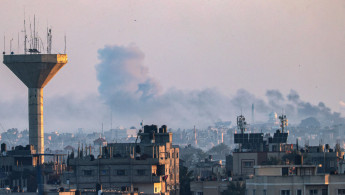Gaza's 'day after' 'an internal Palestinian issue': PLO official
The administration of the Gaza Strip after the current Israeli war is "an internal Palestinian issue", a PLO official asserted to The New Arab on Tuesday, 16 January.
"The future of the Gaza Strip will be defined by the Palestinian people through a national unity leadership, not by US and Israeli plans", Ramzi Rabah, a member of the PLO's executive committee representing the left-wing DFLP, remarked.
"Israel is looking for a formula of collaborationist administration in the Gaza Strip, for which it considers even the Palestinian Authority to be unfit, and we categorically reject this project", said Rabah.
"Dialogue is open among all Palestinian political forces for the formation of a national unity leadership to manage the aftermath of the war," he added.
On Monday, Rabah took part with other PLO executive committee members in a press conference through the local 'Wattan' broadcaster in Ramallah, calling for "a united Palestinian position" to "confront the 'Day After' US project in Gaza".
The PLO officials' initiative called for "the formation of a national unity government" and "an urgent meeting of Palestinian factions secretary generals".
Earlier in November, Palestinian President Mahmoud Abbas said that the Palestinian Authority could play a role in the administration of the Gaza Strip only in the context of a comprehensive solution to the conflict.
Abbas's remarks came during a meeting in Ramallah with the US Secretary of State Antony Blinken, discussing the war aftermath. The US State Department reported that Blinken pushed for reform in the PA to enable it to run Gaza after the war during his meeting with Abbas.
Blinken reportedly discussed the PA's role in Gaza after the war during his last meeting with Abbas last week.
"The US attempt is to separate the aftermath of the war from the real political question, which is the end of the occupation as a path to the solution of the conflict", said Rabah.
"This is why we need a united position, leading to a united leadership that can undertake the responsibility of all of the Palestinian territory, including the aftermath of the war in Gaza", he noted.
#UPDATE Mahmud Abbas is committed to reforming the Palestinian Authority in a way that could "reunite" Gaza and the occupied West Bank under its leadership, top US diplomat Antony Blinken said Wednesday after a meeting with the Palestinian presidenthttps://t.co/EBtdhZukzY pic.twitter.com/hs8i23pOC7
— AFP News Agency (@AFP) January 10, 2024
"This needs both poles of the Palestinian political split to participate, and we are in open dialogue with all political factions who agree on the urgency of uniting the Palestinian voice, including with Fatah and Hamas", he pointed out.
Gaza day after and the West Bank
Earlier this month, the spokesperson for the Palestinian president, Nabil Abu Rdeineh, said that "the future of the Palestinian territory in the Gaza Strip and the West Bank, including eastern Jerusalem, will be decided only by the Palestinian people and not by the occupation or any external party".
Abu Rdeineh's declarations came as part of a statement in which he accused Israel of "silent annexation" of the occupied West Bank through settlement expansion.
On Monday, Hamas's politburo member and senior leader, Ghazi Hamad, said in a televised interview with Egyptian ON TV sat channel that "Hamas is ready to hand over the administration of Gaza to a national unity government", stressing that "the ruling of the Gaza Strip has to be through a Palestinian consensus".
Meanwhile, Israel continues its war on the Gaza Strip for the 102nd day, as the Palestinian health ministry announced that Israel's war on Gaza has killed more than 24,000 Palestinians, two-thirds of whom are women and children.





 Follow the Middle East's top stories in English at The New Arab on Google News
Follow the Middle East's top stories in English at The New Arab on Google News


![MP Essam Diab's pursuit to block TikTok in Egypt has revived an already ongoing debate in the country. [Getty]](/sites/default/files/styles/image_330x185/public/1230748046.jpeg?h=a5f2f23a&itok=-8MqBLLC)